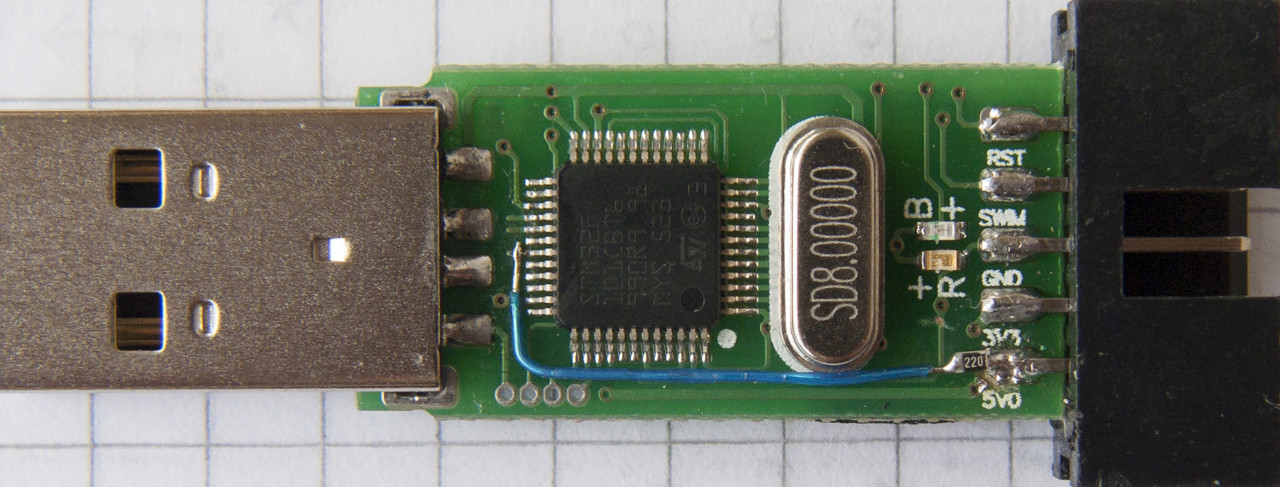Jag skriver objektorienterad C kod på det enkla sättet, utan att allokera minnet. Här är ett exempel på proffisionell C kod som är pedagogisk och helt utmärkt skrivet. Inte någon "AAAhhh jag ska köra allt i assembler bara för att vara cool"-attityd i C-koden.
Kod: Markera allt
#include "DS3231.h"
// Private functions
static void setAlarmSecond(DS3231_I2C* i2c, uint8_t seconds, uint8_t address);
static void setAlarmMinutes(DS3231_I2C* i2c, uint8_t minutes, uint8_t address);
static void setAlarmHours(DS3231_I2C* i2c, uint8_t hours, uint8_t address);
static void setAlarmDay(DS3231_I2C* i2c, uint8_t days, uint8_t address);
static void setAlarmDate(DS3231_I2C* i2c, uint8_t dates, uint8_t address);
/* Create the structure
* Address table:
* A2, A1, A0 = 000 = 0x0
* A2, A1, A0 = 001 = 0x1
* A2, A1, A0 = 010 = 0x2
* A2, A1, A0 = 011 = 0x3
* A2, A1, A0 = 100 = 0x4
* A2, A1, A0 = 101 = 0x5
* A2, A1, A0 = 110 = 0x6
* A2, A1, A0 = 111 = 0x7
*/
void DS3231_init(DS3231_I2C* i2c, I2C_HandleTypeDef* hi2c, uint8_t addr, uint8_t enableWeekAlarm, uint8_t enableDateAlarm){
i2c->addr = 0xD0 | (addr << 1);
i2c->hi2c = hi2c;
// Check if we have the correct connection with our RTC
if (HAL_I2C_IsDeviceReady(i2c->hi2c, i2c->addr, 10, 10) != HAL_OK){
HAL_GPIO_WritePin(GPIOA, GPIO_PIN_5, GPIO_PIN_SET); // This MUST have GPIO PA5 ready to use - ERROR I2C - Wrong address
return;
}
// Set the control. Enable/disable the alarms and enable alarm output SQW
uint8_t pData[2] = {0x0E, 0x1C | (enableWeekAlarm << 1) | enableDateAlarm};
HAL_I2C_Master_Transmit(i2c->hi2c, i2c->addr, pData, 2, 10);
DS3231_offTriggAlarm(i2c);
}
/*
* Set the clock.
* Second:
* Variable second can be 0-59.
*
* Minute:
* Variable minutes can be 0-59.
*
* Hour:
* Variable hours can be 0-23.
*
* Day:
* Variable days can be 1-7.
*
* Date:
* Variable dates can be 1-31.
*
* Month:
* Variable months can be 1-12
*
* Year:
* Variable years can be 0-99
*/
void DS3231_setClock(DS3231_I2C* i2c, uint8_t seconds, uint8_t minutes, uint8_t hours, uint8_t days, uint8_t dates, uint8_t months, uint8_t years){
uint8_t pData[8];
pData[0] = 0x00; // Address for the first register
// Seconds
uint8_t ten = seconds/10; // This will result 0, 1, 2, 3, 4, 5
uint8_t part = seconds - ten*10; // This will result 0, 1, 2, 3, 4, 5, 6, 7, 8, 9
pData[1] = (ten << 4) | part;
// Minutes
ten = minutes/10; // This will result 0, 1, 2, 3, 4, 5
part = minutes - ten*10; // This will result 0, 1, 2, 3, 4, 5, 6, 7, 8, 9
pData[2] = (ten << 4) | part;
// Hours
ten = hours/10; // This will result 0, 1, 2.
part = hours - ten*10; // This will result 0, 1, 2, 3, 4, 5, 6, 7, 8, 9
pData[3] = (ten << 4) | part;
// Day
pData[4] = days;
// Date
ten = dates/10; // This will result 0, 1, 2, 3.
part = dates - ten*10; // This will result 0, 1, 2, 3, 4, 5, 6, 7, 8, 9
pData[5] = (ten << 4) | part;
// Month
ten = months/10;
part = months - ten*10;
pData[6] = (ten << 4) | part;
// Year
ten = years/10;
part = years - ten*10;
pData[7] = (ten << 4) | part;
HAL_I2C_Master_Transmit(i2c->hi2c, i2c->addr, pData, 8, 10);
}
void DS3231_getClock(DS3231_I2C* i2c){
uint8_t rData[7];
HAL_I2C_Mem_Read(i2c->hi2c, i2c->addr, 0x00, 1, rData, 7, 1000);
// Second
i2c->second = (10*(rData[0] >> 4)) + (rData[0] & 0xF);
i2c->minute = (10*(rData[1] >> 4)) + (rData[1] & 0xF);
i2c->hour = (10*(rData[2] >> 4)) + (rData[2] & 0xF); // 24-hour clock
i2c->day = rData[3];
i2c->date = (10*(rData[4] >> 4)) + (rData[4] & 0xF);
i2c->month = (10*(rData[5] >> 4)) + (rData[5] & 0xF);
i2c->year = (10*(rData[6] >> 4)) + (rData[6] & 0xF);
}
// Exactly the same as DS3231_setClock arguments.
void DS3231_setDateAlarm(DS3231_I2C* i2c, uint8_t seconds, uint8_t minutes, uint8_t hours, uint8_t dates){
setAlarmSecond(i2c, seconds, 0x07);
setAlarmMinutes(i2c, minutes, 0x08);
setAlarmHours(i2c, hours, 0x09);
setAlarmDate(i2c, dates, 0xA);
}
// Exactly the same as DS3231_setClock arguments.
void DS3231_setWeekAlarm(DS3231_I2C* i2c, uint8_t minutes, uint8_t hours, uint8_t days){
setAlarmMinutes(i2c, minutes, 0xB);
setAlarmHours(i2c, hours, 0xC);
setAlarmDay(i2c, days, 0xD);
}
// Un-Trigger of the alarm
void DS3231_offTriggAlarm(DS3231_I2C* i2c){
uint8_t pData[2] = {0x0F, 0b00000000};
HAL_I2C_Master_Transmit(i2c->hi2c, i2c->addr, pData, 2, 10);
}
// Read the alarm status. 0b11 = Both alarms are on. 0b1 = Only date alarm is on. 0b10 = Only week alarm is on
uint8_t DS3231_readALarmStatus(DS3231_I2C* i2c){
uint8_t rData = 0xF;
HAL_I2C_Master_Transmit(i2c->hi2c, i2c->addr, &rData, 1, 10);
HAL_I2C_Master_Receive(i2c->hi2c, i2c->addr, &rData, 1, 10);
rData = rData << 6;
rData = rData >> 6;
return rData; // We only want 11, 10, 01 or 00
}
static void setAlarmSecond(DS3231_I2C* i2c, uint8_t seconds, uint8_t address){
uint8_t ten = seconds/10;
uint8_t second = seconds - ten*10;
uint8_t pData[2] = {address, (ten << 4) | second};
HAL_I2C_Master_Transmit(i2c->hi2c, i2c->addr, pData, 2, 10);
}
static void setAlarmMinutes(DS3231_I2C* i2c, uint8_t minutes, uint8_t address){
uint8_t ten = minutes/10;
uint8_t minute = minutes - ten*10;
uint8_t pData[2] = {address, (ten << 4) | minute};
HAL_I2C_Master_Transmit(i2c->hi2c, i2c->addr, pData, 2, 10);
}
static void setAlarmHours(DS3231_I2C* i2c, uint8_t hours, uint8_t address){
uint8_t ten = hours/10;
uint8_t hour = hours - ten*10;
uint8_t pData[2];
pData[0] = address;
pData[1] = (ten << 4) | hour;
HAL_I2C_Master_Transmit(i2c->hi2c, i2c->addr, pData, 2, 10);
}
static void setAlarmDay(DS3231_I2C* i2c, uint8_t days, uint8_t address){
uint8_t ten = days/10;
uint8_t day = days - ten*10;
uint8_t pData[2] = {address, (1 << 6) | (ten << 4) | day};
HAL_I2C_Master_Transmit(i2c->hi2c, i2c->addr, pData, 2, 10);
}
static void setAlarmDate(DS3231_I2C* i2c, uint8_t dates, uint8_t address){
uint8_t ten = dates/10;
uint8_t date = dates - ten*10;
uint8_t pData[2] = {address, (ten << 4) | date};
HAL_I2C_Master_Transmit(i2c->hi2c, i2c->addr, pData, 2, 10);
}
